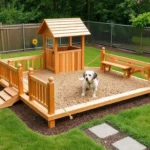
Introduction
Choosing the right dog breed is one of the most significant decisions a potential pet owner can make. As canine companions become an integral part of our lives, aligning a dog’s characteristics with your lifestyle is crucial for a fulfilling relationship. According to the American Pet Products Association, approximately 67% of U.S. households, or about 85 million families, own a pet, with dogs being the most popular choice. With over 340 recognized dog breeds worldwide, the task of selecting the right one can feel overwhelming.
To simplify your decision-making process, this article will explore several essential factors to consider when asking yourself, what dog breed is right for me. From your daily routine and living situation to the specific needs of various breeds, we will guide you through the considerations necessary for making an informed choice.
Understanding Your Lifestyle
Daily Routine
Understanding your daily routine is paramount when considering what dog breed is right for me. Dogs require time, attention, and care, and your availability will significantly influence the type of breed that fits seamlessly into your life. If you work long hours or travel frequently, a breed that is more independent and low-maintenance may be ideal. Conversely, if you have a flexible schedule or can work from home, you might consider a breed that thrives on companionship and interaction.
Living Situation
Your living situation is another crucial factor to consider when determining what dog breed is right for me. Do you live in an apartment or a house? If you reside in a smaller space, you may want to opt for a smaller breed that adapts well to confined areas. On the other hand, if you have a large home with a yard, larger breeds that need space to roam may be suitable. Additionally, access to outdoor spaces, such as parks or walking trails, can greatly impact a dog’s exercise needs and overall happiness.
Family Dynamics
Family dynamics play a significant role in choosing the right breed. If you have children or elderly individuals in your home, you will want to select a breed known for its gentle temperament and compatibility with kids or seniors. Additionally, consider the presence of other pets in your household. Some dog breeds have strong prey drives or territorial instincts, which may not be compatible with other animals.
Key Factors to Consider
Size of the Dog
When asking what dog breed is right for me, size is a fundamental consideration. Dog breeds come in various sizes, each with its pros and cons.
- Small Breeds: Ideal for apartment living, small breeds like the Pug or Chihuahua require less space but may still need daily walks.
- Medium Breeds: Breeds like Beagles or Cocker Spaniels offer a balance, being adaptable to both apartments and houses.
- Large Breeds: Larger breeds, such as Golden Retrievers or German Shepherds, often require more space and exercise but can be wonderful companions for active families.
Energy Level
Energy level is another critical factor in determining what dog breed is right for me. Different breeds vary significantly in their exercise needs.
- High-Energy Breeds: Breeds like the Border Collie or Australian Shepherd require ample exercise and mental stimulation. They thrive in active households and may become destructive if bored.
- Low-Energy Breeds: Breeds such as the Basset Hound or French Bulldog are content with shorter walks and more relaxation time, making them suitable for less active lifestyles.
Grooming Requirements
Grooming needs can also influence your decision when figuring out what dog breed is right for me. Some breeds require regular grooming and maintenance, while others are low-maintenance.
- High-Maintenance Breeds: Breeds like the Poodle or Shih Tzu require frequent grooming to maintain their coats, which can be costly and time-consuming.
- Low-Maintenance Breeds: Breeds such as the Labrador Retriever or Beagle have short coats that require minimal grooming, making them easier to care for.
Temperament and Behavior
Understanding breed-specific behaviors is essential in determining what dog breed is right for me. Some breeds are known for their guarding instincts, while others are more sociable and friendly.
- Guarding Breeds: Breeds like Rottweilers and Doberman Pinschers may require experienced owners and proper socialization to ensure they are well-adjusted.
- Sociable Breeds: Breeds such as Golden Retrievers and Cavalier King Charles Spaniels are known for their gentle and friendly nature, making them excellent family pets.
Popular Dog Breeds by Lifestyle
Active Lifestyles
If you lead an active lifestyle, several dog breeds can keep up with your energy levels.
- Labrador Retriever: Known for their friendly demeanor and high energy, Labs excel in active homes.
- Border Collie: Highly intelligent and energetic, they thrive on physical and mental challenges.
- Australian Shepherd: This breed is perfect for those who enjoy outdoor activities and require a companion for hiking or running.
Family-Friendly Breeds
For families with children, selecting a breed that is gentle and patient is vital.
- Golden Retriever: Renowned for their friendly nature, they make fantastic family pets.
- Beagle: Their playful and curious disposition makes them great companions for kids.
- Boxer: Known for their boundless energy and affectionate nature, Boxers are playful and protective.
Low-Maintenance Breeds
If you’re looking for a dog that requires minimal grooming and care, consider the following breeds:
- Cavalier King Charles Spaniel: While they have a beautiful coat, they are relatively easy to groom compared to other breeds.
- French Bulldog: With their short coat and minimal shedding, they are low-maintenance and adapt well to apartment living.
Apartment-Friendly Breeds
If you live in an apartment or smaller home, some breeds adapt better to such environments.
- Dachshund: Their small size makes them perfect for apartment living, and they require moderate exercise.
- Pug: Pugs are friendly and adaptable, thriving in smaller spaces and requiring less exercise.
- Shih Tzu: Known for their affectionate nature, they are perfect for individuals or families living in smaller homes.
Assessing Your Readiness for a Dog
Commitment and Responsibility
Owning a dog is a long-term commitment, and understanding the responsibilities involved is crucial. The average lifespan of a dog varies by breed, but many can live between 10 to 15 years. This commitment requires not just time but also emotional investment.
Financial Considerations
Before deciding what dog breed is right for me, it’s vital to consider the financial aspects. The initial costs of adoption or purchasing a dog can range from $50 to over $3,000, depending on the breed and source. Regular expenses include food, grooming, veterinary care, and potential emergencies. A well-prepared budget can help ensure you’re ready for dog ownership.
Time Commitment
Every dog requires daily exercise, training, and socialization. Depending on the breed, this can range from 30 minutes to several hours each day. It’s essential to consider how your schedule, including vacations and travel plans, will impact your ability to care for a dog.
Researching Breeds
Resources for Learning About Breeds
When exploring what dog breed is right for me, there are numerous resources available. Consider reading books on dog breeds, visiting reputable websites, and engaging in forums dedicated to dog ownership. Breed-specific rescue organizations can also provide valuable insights and help you understand the needs of different breeds.
Visiting Breeders or Shelters
If you decide to adopt, visiting breeders or shelters can be extremely informative. Responsible breeders will provide health certifications and allow you to meet the puppy’s parents. Shelters can give you insight into a dog’s behavior and history, ensuring you find a good match for your lifestyle.
Making the Final Decision
Evaluating Potential Breeds
After gathering all the necessary information, evaluate potential breeds based on your lifestyle compatibility. Create a shortlist that considers size, energy level, grooming needs, and temperament.
Consultations and Professional Advice
Before making your final decision, consider consulting with veterinarians or dog trainers. Their insights can help you understand the nuances of different breeds and offer guidance tailored to your lifestyle.
Conclusion
In conclusion, choosing the right dog breed is a decision that can significantly impact your life and the life of your new furry friend. By understanding your lifestyle, considering key factors, and evaluating various breeds, you can find a companion that fits seamlessly into your life.
Take your time with this essential decision. Research thoroughly and reflect on what you can offer a dog in terms of love, time, and commitment. Remember, the right breed can lead to a long, joyful relationship, while the wrong choice may result in frustration for both you and your pet. Happy dog hunting!









